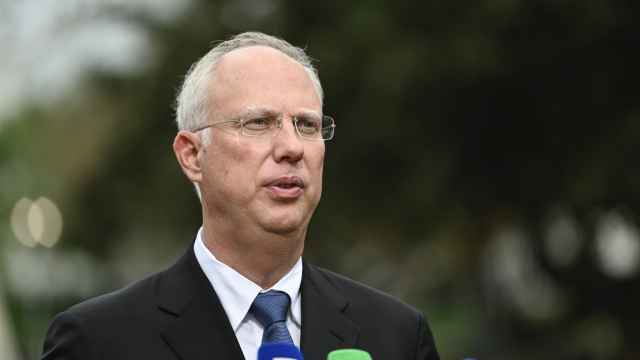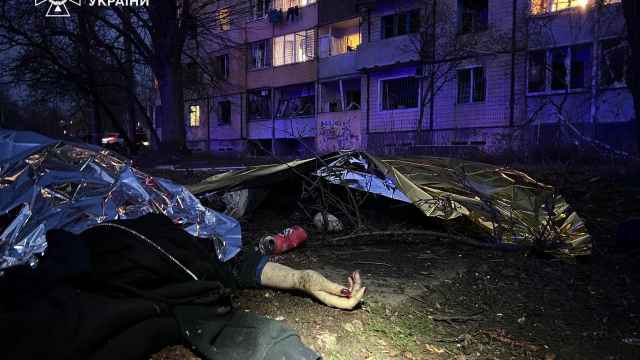ABU DHABI, United Arab Emirates — As the International Defense Exhibition got under way Sunday, Russia was poised to kick off another banner year as the world's second-largest weapons exporter.
More than 10 percent of the exhibitors at the world's largest arms trade show are from Russia.
Last year, Russia sold $14 billion worth of arms to clients abroad. In January, its arms producers exported $1 billion worth of the total order book value of $46 billion, RIA-Novosti reported.
The more than 30 companies from Russia participating in the trade show, which runs through Feb. 21, include defense industry plants, the state arms export monopoly and research departments. They will show products ranging from small arms to rocket systems.
"The Russian defense industry is in a good position to sell aircraft and other components to emerging defense markets in Africa and Latin America as well as to more traditional buyers in Southeast Asia, for example, Malaysia," said Theodore Karasik, head of research and consultancy at the Institute for Near East and Gulf Military Analysis. "The quality is high and price reasonable."
Notable firms hawking their wares this week include Almaz-Antei, based in Moscow. One of the 30 largest defense manufacturers in the world, it specializes in air defense and anti-aircraft weaponry, including the famous S-300 rocket system, which Russia was due to sell to Iran. But it canceled the contract under pressure from the West.
The firm gets 30 percent of its revenues from export sales to China, India, South Korea and Venezuela. It reported 2009-10 export revenue of $1 billion.
Another prominent participant is Tulsky Instrument Design. It makes air-defense missiles, gun systems and armament, anti-tank guided weapons and assault arms.
Last month, Brazil announced its intention to secure assembly licenses for Pantsir-S1 and Igla defense systems in a deal estimated at more than $1 billion.
The architect of the world-famous Kalashnikov assault rifle, Izhmash, will have a stand at the show, where is it is most likely to promote its latest version of Kalashnikov, called the AK-12, which can be fully operated using only one hand.
Although the Defense Ministry has not approved the AK-12 for the Russian army, Izhmash that it expects the weapon to be in demand with foreign buyers.
The company's confidence was buoyed by a trade show this month in Las Vegas, where it displayed its new Saiga self-loading carbine, Saiga-12 shotgun and others weapons it is allowed to sell in the United States, which has been a booming market for Izhmash.
The third-generation tanks Terminator and T-C will be on display in Abu Dhabi by Uralvagonzavod, based in Nizhny Tagil.
India is still the No. 1 customer for Russian weapons, in 2012 taking delivery of Talwar-class frigates, 24 Su-30MKI jet fighters, several MiG-29K/UPGs and up to 20 Mi-17V-5 transport helicopters.
Venezuela, Algeria and Vietnam are also up-and-coming consumers of Russian arms.
Last year, Russia resumed military collaboration with a number of foreign countries, including Ghana, Oman, Tanzania and Afghanistan, said Alexander Fomin, director of the Federal Service on Military and Technical Collaboration.
But experts say contractual details remain a hindrance to Russian arms sales.
"The only problem in selling Russian equipment is how the deals are structured, including post sales maintenance and training. Improvements are being made in this contractual system but more work and guarantees need to be done," Karasik said.
Contact the author at bizeditor@imedia.ru
A Message from The Moscow Times:
Dear readers,
We are facing unprecedented challenges. Russia's Prosecutor General's Office has designated The Moscow Times as an "undesirable" organization, criminalizing our work and putting our staff at risk of prosecution. This follows our earlier unjust labeling as a "foreign agent."
These actions are direct attempts to silence independent journalism in Russia. The authorities claim our work "discredits the decisions of the Russian leadership." We see things differently: we strive to provide accurate, unbiased reporting on Russia.
We, the journalists of The Moscow Times, refuse to be silenced. But to continue our work, we need your help.
Your support, no matter how small, makes a world of difference. If you can, please support us monthly starting from just $2. It's quick to set up, and every contribution makes a significant impact.
By supporting The Moscow Times, you're defending open, independent journalism in the face of repression. Thank you for standing with us.
Remind me later.





